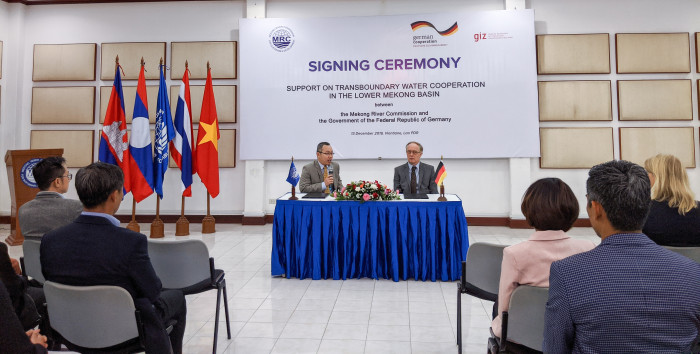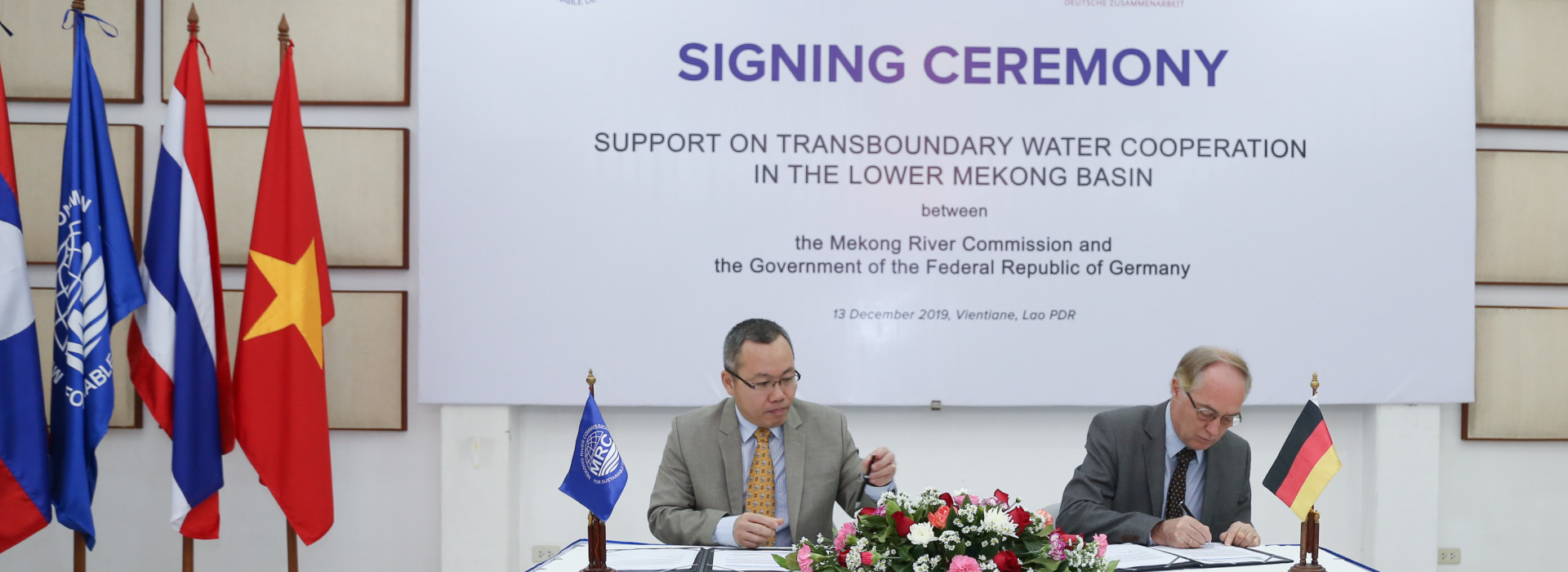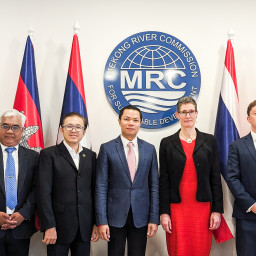Cross-border water cooperation and joint environmental monitoring received German support
Vientiane, Lao PDR, 13 December 2019 — The German government today provided additional 2 million euro (approx. U$2.2 million) to the Mekong River Commission to increase cross-border water dialogue and cooperation and support efforts in monitoring transboundary environmental impacts from Mekong mainstream dams.
The funding agreement was inked by the MRC Secretariat’s Chief Executive Officer Dr. An Pich Hatda and the German Ambassador to Lao PDR Mr. Jens Lütkenherm during a signing ceremony held in Vientiane on December 13. This extra funding has brought the German contribution to the MRC to 6.45 million euro for the current strategic plan 2016-2020 and the beginning of the new plan 2021-2025.
Reaffirming Germany’s longstanding partnership with the Commission, the funding aims to boost dialogue and cooperation on transboundary water resource planning and management among the four lower Mekong countries – Cambodia, Lao PDR, Thailand, and Viet Nam.
Covering a 2019-2021 period, the grant is also set to increase efforts in monitoring transboundary environmental impacts from the already built Mekong mainstream dams – Xayaburi and Don Sahong – and providing measures to reduce the effects through an MRC’s Joint Environmental Monitoring Program.
“The German support comes at a critical time when the Mekong River is facing difficult trade-offs between increased development in the energy, transport and agriculture sectors and impacts on the environment and local livelihoods,” Dr. Hatda said.

Dr. An Pich Hatda, the MRC Secretariat CEO, addresses the participants attending the signing ceremony this morning in Vientiane.
According to the latest MRC’s flow monitoring, the 2019 drought has brought the Mekong water levels to their lowest points in living memory or at least over the last 60 years. Most parts of the basin have been since June experiencing an exceptionally regionally low flow.
This extremely low flow, slow drop in the river sediments, and presence of algae on the sand and bedrock river bottom, it added, are among the contributing factors that have changed some parts of the Mekong River from its typical brown color to an aquamarine hue. The MRC warned that the blue-green hue is likely to occur elsewhere, bringing possible risks including change in river productivity and reduced productivity of aquatic biodiversity due to high water clarity.
“These emerging issues require meticulous and speedy monitoring and reporting for a proper basin management, thanks to Germany for making the work possible,” Dr. Hatda said.
Germany has funded the MRC since 1995, providing close to 50 million euro in both technical and financial support. During this period, the German support has enabled the MRC to implement various strategic activities, including institutional reforms, sustainable hydropower development, integrated water resources management, flood mitigation, and climate change.
"At a time when the Mekong is increasingly under pressure from impacts of water management projects for irrigation, hydro power and water supply, the work of the MRC in monitoring and managing the basin changes becomes ever more critical,” Mr. Lütkenherm said.
“Our additional grant should allow the MRC to fast-track work on assessing such impacts and ensure that decision-makers in the Basin are aware of the consequences and take timely and appropriate actions.”
Read the news in Khmer, Lao or Vietnamese.
Note to editors:
The MRC is an intergovernmental organization for regional dialogue and cooperation in the lower Mekong river basin, established in 1995 based on the Mekong Agreement between Cambodia, Lao PDR, Thailand, and Viet Nam. The organization serves as a regional platform for water diplomacy as well as a knowledge hub of water resources management for the sustainable development of the region.
- END -





